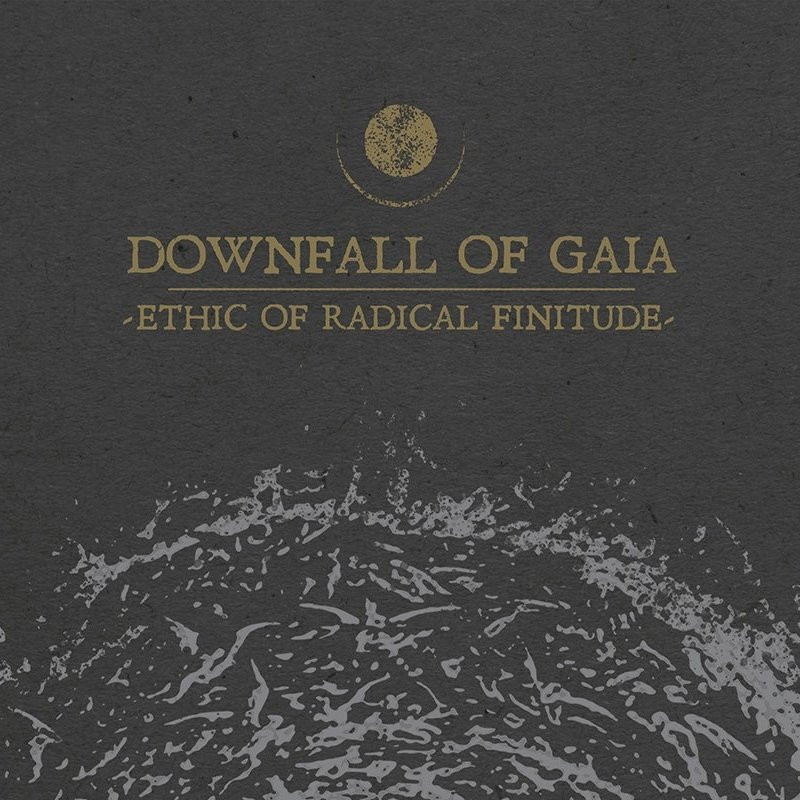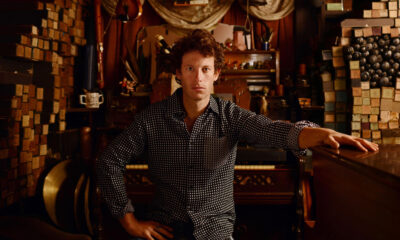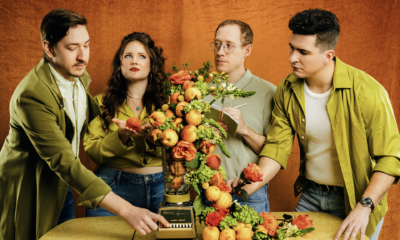Interviews
Racking Up the Frequent Flyer Miles: An Interview with DOMINIK GONCALVES dos REIS of Trans-Atlantic Black Metallers DOWNFALL OF GAIA
We caught up with Dominik Goncalves dos Reis from doom metal band Downfall of Gaia and put his group in the crosshairs for a bit of a chinwag regarding their new Metal Blade record, Ethic of Radical Finitude.

I’ve always admired musicians able to pull off being a band despite members not living in the same city or town. As someone who prides himself on some amount of organizational skill, I get inspired watching or hearing about the process and dedication undertaken by a group of individuals spread far and wide coming together for creative purposes. It’s like the artistic/musical manifestation of different Combiner Transformers coming together to form the big-ass robots-in-disguise Transformer, except the goal here is post-black metal with an atmospheric and sludgy sensibility, not a mechanical war/apocalypse.
Downfall of Gaia is one such band with drummer Michael Kadnar holding court in New York City while the rest of the band (guitarist/vocalist Dominik Goncalves dos Reis, bassist/vocalist Anton Lisovoj and guitarist Marco Mazzola) call the German cities of Hamburg and Berlin home. The quartet has again overcome what would normally, to most, be an insurmountable geographical divide for the writing and release of its fifth full-length, Ethic of Radical Finitude, set for release on February 8th courtesy of Metal Blade Records.
Add to this the regular amounts of touring the band has done and will do, a European tour with Mantar is upcoming this spring and they will feature at some plum festivals in the summer, and it’s clear that Downfall of Gaia brush aside the most aggravating hurdles with a scoffing laugh and dismissive wave of the hand. Being no stranger to the use of the internet to get the job done, we caught up with Goncalves dos Reis and put his band in the crosshairs for a bit of a chinwag.
“As Our Bones Break to the Dance” is the band’s most recently-released track from Ethic of Radical Finitude.
Given that scientists have predicted doomsday scenarios for life on the plant within 12 to 50 years, when you chose the name of the band a decade ago, did you think that it would be so prophetic? Is there some sort of perverse satisfaction you can claim in saying, “I told you so,” to the rest of society?
Dominik Goncalves dos Reis: I definitely wouldn’t call this “satisfaction,” but I think it’s already somehow clear to all the people walking through life with open eyes. I mean, there is still the chance to get something done in a positive way, let’s name it “The Final Call,” some sort of damage control, but if things will continue like this I seriously think that there are only darker days ahead.
How long did it take to write Ethic of Radical Finitude and what motivated you coming out of (previous album) Atrophy?
Goncalves dos Reis: Overall, the whole process took a year and a few months; sixteen months in total until we hit the studio. I guess for this record we simply wanted to give ourselves the time it needed and not to rush anything. One of the major motivations I would say was the aspiration not to get stuck. We wanted to do things a bit different and we wanted to add new nuances to our music.
Did you do anything differently to achieve that?
Goncalves dos Reis: We went a few new ways production-wise since we wanted to have a more detailed, but still forceful, sound compared to our previous release. Usually, the four of us record together in the same studio, but this time we wanted to do things a bit differently. Mike recorded drums in New Jersey while the rest of us did their parts in Berlin. We simply picked the studios of our choice (and of course within our budget) to get the best sounding result possible.
Also, for mixing and mastering, we took a new path compared to our recent records. Not that we are unhappy with our previous albums, but we somehow felt that the new record would need a different production. This time we had the pleasure to work together with V. Santura of Triptykon and Dark Fortress and his work gave our sound a whole new dynamic. It was exactly what we were looking for! So basically, we did a lot of things differently, but it was all totally worth it in my opinion.

I’m assuming you guys have been able to smooth out how to work as a unit despite the distance between Germany and the U.S., though I’m also assuming things aren’t ever going to be 100 percent perfect. In what ways does that divide still impact the band’s creative process?
Goncalves dos Reis: Of course, we don’t get together once a week to rehearse like some other bands do, but I wouldn’t say there is any kind of bad impact caused by the distance. I would even say that from time to time it can be the complete opposite; it can be really helpful. Due to the fact that we can’t get together as much as we want to, we are forced to work things out as much as possible before we meet in person. Distance and a limited time frame can be a motivator. Luckily, through the internet, it’s no problem at all to get this done.
What are some of the advantages and disadvantages of being a dual-continental band?
Goncalves dos Reis: Let’s start with the disadvantages. There’s definitely the financial aspect. Unfortunately, we are pretty limited when it comes to playing just single shows which can be a pain in the ass from time to time. We’ve had to decline a lot of cool offers just because it simply wasn’t possible for us to get together for just one or two shows. It would be way too expensive and, of course, also very stressful. Because of that, we need to focus on touring.
On the other hand, the advantages are definitely contacts. Especially on our last U.S. tour, this was a really helpful thing since we almost didn’t have to pay for cheap motels along the way each day which saved us a lot of money. Fortunately, Mike knew enough people along the routing. It’s stuff like this, the little things.
Is there an amount of off-the-cuff experimentation, spontaneity, and improvisation that you lament not having as part of the writing process?
Goncalves dos Reis: Not really.
What studios were used for recording and how would you characterize the recording process? Did you find yourselves doing anything differently or experiencing anything novel in the studio in trying to capture your particular sound or even there being a difference in process/technology compared to previous recording sessions?
Goncalves dos Reis: The drums were recorded at Backroom Studios in New Jersey, which is run by Kevin Antreassian (ex-The Dillinger Escape Plan). Guitars, bass, and vocals were done in Berlin at Hidden Planet Studio together with Jan Oberg and mixed/mastered by V. Santura at Woodshed Studio. Overall, I wouldn’t say that we did anything specifically different but we definitely paid a lot of attention to the general recording sound and maybe gave ourselves a bit more time for details than we did on our previous releases.
“Ephemerol” is an absolute epic from Downfall of Gaia’s last album, Atrophy.
Did anyone travel to visit the other studio locales at any point during the recording or were the Germans and Americans left to their respective devices in the studio?
Goncalves dos Reis: I wish! But as most can imagine, this isn’t something within our budget. Of course, we were in contact the whole time via the Internet, sending files back and forth. So basically, we were all around without being around. Thanks to the world wide web!
What does the title of the album mean and refer to?
Goncalves dos Reis: I was talking to our bass player Toni about the lyrics I wrote for the new record. Usually, he always delivers the names for our records. This is his thing. A few days later after we talked about all of this he came up with the idea of naming the record Ethic of Radical Finitude. I immediately felt that these four words are the perfect plot. “Ethic…” is telling a story about discontented minds and the never-ending pursuit for more. I guess everyone in life is trying to find this special “warm” and safe place, their special place, to feel “home,” to feel “safe,” to feel satisfied.
But maybe at some point, you need to accept that it may never come, that you will never “arrive.” Our given time is limited, limited by death. But even if death itself has a bad reputation, it’s the only thing that makes the time you have worthy since without it everything would be forever and absolutely nothing would have any value. No one would try to use their given time, no one would ever be on the hunt for their special place. It simply would be meaningless. It’s relentless finitude.
Many will refer to an album as a snapshot of a band at a particular time. With Ethic of Radical Finitude being the snapshot, what will both the average person and fan of the band see in this particular photo?
Goncalves dos Reis: It is definitely our most dynamic, most melodic and most structured release to date. The snapshot would probably just show a band being absolutely satisfied with the overall result. Probably not the most crazy snapshot people have ever seen, but this is simply how it feels.
Finally, we’ll leave you with “Carved into Shadows” from Aeon Unveils the Thrones of Decay.
Given the state of the world and world politics in both countries of your band members, I can only imagine the discussions that happen when you are hanging out in person! What are some of the topics that come up and do you find yourselves with many similar, or differing, opinions about the shit going on around you?
Goncalves dos Reis: Luckily, most of the time we are on the same page and all of us somehow share the same political views. But you are right, the world as it is right now is a really fucked up place. It feels like history is repeating, which is really sad and scary to see. It is a sad thing to see what is happening right now in Europe or even worldwide. An obviously right-wing opinion has become the new “middle,” the new standard.
It is disgusting to see more and more right-wing people becoming the leaders of countries and it is sad to see that there are a lot of followers, people who aren’t afraid anymore to speak out their inhumane point of view. We are living in absolutely disturbing times and I think it is more important than ever to have an opinion and a voice. I think this is something all of us can agree within the band.
How did former band members drummer Johannes Stoltenberg and guitarist Peter Wolff come to perform on the album? Was that experience bittersweet or a reminder of how things used to be and how they’ve been worked out for the better now?
Goncalves dos Reis: Even if our paths had to split at some point it was a completely relaxed and enjoyable experience working together again! All of us are still in contact and there is absolutely no bad blood so I simply asked them if they wanted to be a part of our new record. The most exciting thing, in my opinion, is the fact that they brought in their new influences. Not simply playing their old instruments, more bringing in their new paths, the more electronic, “synthy” path they took after they left the band. This really made the songs even brighter and gave them a very special touch!
What’s the plan once the album is out?
Goncalves dos Reis: Right now, we’ve got a few things in the making. We definitely want to be on the road as much as possible! New territories would be great, but for the beginning, we will focus on Europe.
-

 Music6 days ago
Music6 days agoTake That (w/ Olly Murs) Kick Off Four-Night Leeds Stint with Hit-Laden Spectacular [Photos]
-

 Alternative/Rock14 hours ago
Alternative/Rock14 hours agoThe V13 Fix #011 w/ Microwave, Full Of Hell, Cold Years and more
-

 Alternative/Rock1 week ago
Alternative/Rock1 week agoThe V13 Fix #010 w/ High on Fire, NOFX, My Dying Bride and more
-

 Features6 days ago
Features6 days agoTour Diary: Gen & The Degenerates Party Their Way Across America
-

 Culture1 week ago
Culture1 week agoDan Carter & George Miller Chat Foodinati Live, Heavy Metal Charities and Pre-Gig Meals
-

 Music1 week ago
Music1 week agoReclusive Producer Stumbleine Premieres Beat-Driven New Single “Cinderhaze”
-

 Indie14 hours ago
Indie14 hours agoDeadset Premiere Music Video for Addiction-Inspired “Heavy Eyes” Single
-

 Alternative/Rock1 week ago
Alternative/Rock1 week agoThree Lefts and a Right Premiere Their Guitar-Driven Single “Lovulator”













